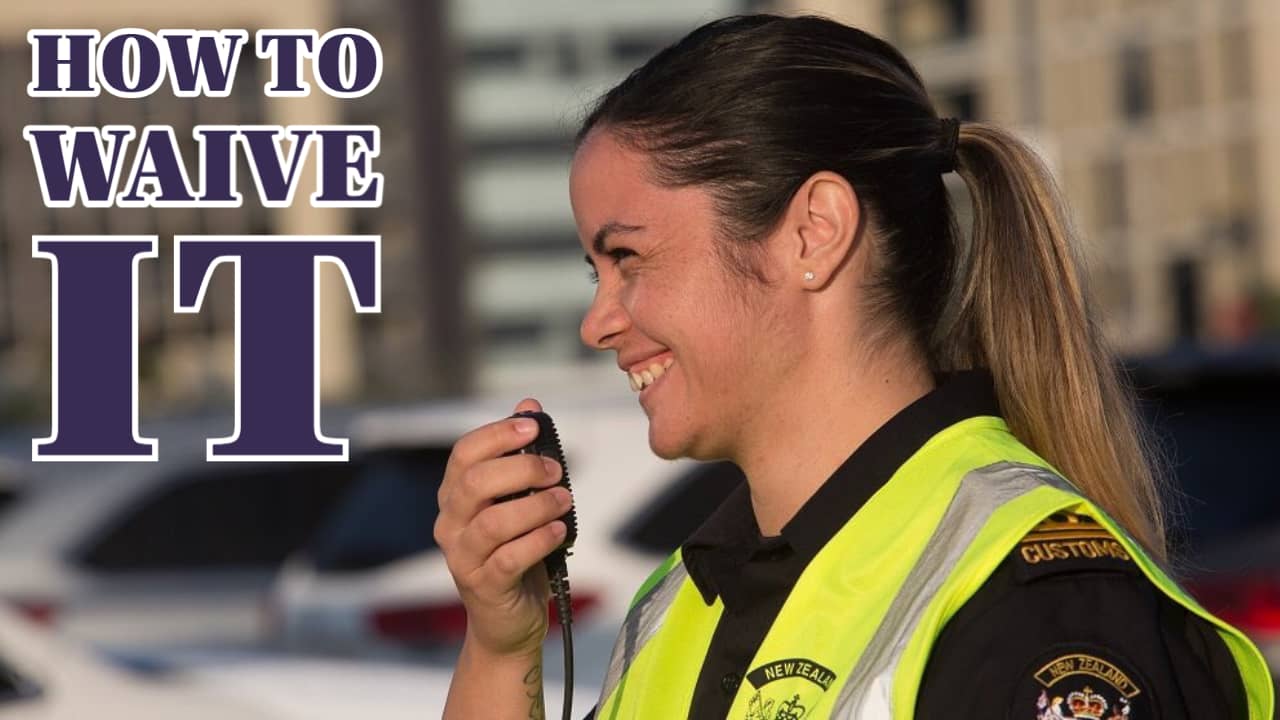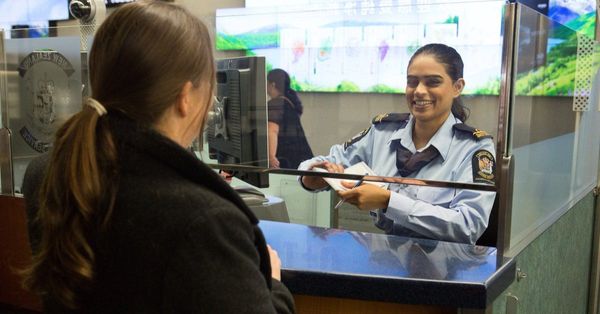
Instant Fines by NZ Customs (70 Offences That Can Incur It)
6-minute read
NZ Customs officers can issue Infringement Notices, with an instant fine of $400 for an individual or $800 for a business.
Infringement Notices enable Customs to manage minor offending involving travel, goods and craft (aircraft or ship) by issuing fines for 70 offences.
These are strict liability offences, which means you have committed an offence even though you had no intention of doing so, and there is no criminal conviction.
They are issued for minor misconduct that justify more than a warning, as an alternative to prosecution. Once the fine has been paid, all guilt or liability disappears.
To issue an Infringement Notice a Customs officer needs to have reasonable grounds to believe an offence has been committed. A warning notice may be issued instead, if appropriate.
There are 70 offences (see the list below) that can incur a New Zealand Customs Infringement Notice.
You may receive an Infringement Notice or instant fine when you break the law or for non-compliant activity. This is less than a criminal conviction – it’s like getting a speeding or parking ticket.
The fine is $400.00 for an individual and $800.00 for a company
Non-compliance include:
- failing to declare on your Passenger Arrival Card prohibited goods, NZ$10,000 or more cash, or tobacco and alcohol over the duty-free limit
- refusing or failing to answer questions about documents, records, or travel movements
- importing prohibited goods
- the contents of your parcel do not match the description on the parcel declaration
In legal terms, these are strict liability offences, which means you may have broken the law even if you didn’t mean to.
Infringement Notices do not require any court action and do not give you a criminal conviction.
- Making an erroneous (wrong or incorrect) declaration or written statement.
- Producing or delivering documents that are erroneous (wrong, incorrect).
- Failing to stop using an electronic device (where sign prohibits) when asked to do so.
- Importing, or loading, or unloading prohibited goods.
- Exporting, loading or unloading prohibited goods.
- Exporter fails to notify Customs of goods that could be used for prohibited uses.
- Removing prohibited goods from a Customs-controlled area.
- Failing to comply with conditions of licence, permit or consent to import or export prohibited goods.
- Failing to state name and details, or produce evidence of identity or entitlement to travel.
- Failing to retain prescribed records for the prescribed period.
- Failing to make records available and answer questions about them.
- Failing or refusing to answer questions.
- Giving an incorrect answer when required to answer questions.
- Person in charge of arriving craft fails to immediately report to Customs officer or constable, allows unloading of goods or allows passengers to leave vicinity of craft.
- Failing to comply with term, condition, or restriction of licence in a Customs-controlled area.
- Licensee fails to comply with requirement to provide Customs facilities or store goods in Customs-controlled area.
- Unloading goods without permission or where safety not threatened.
- Failing to produce evidence of identity, entitlement to travel, or other matters, on demand.
- Registered user fails to comply with conditions for security of unique user identifiers.
- Unregistered user uses a unique user identifier to authenticate transmission of document.
- Registered user uses someone else’s unique user identifier to authenticate a transmission.
- Leaving arriving craft without authorisation.
- Leaving or boarding arriving craft before inward report made.
- Unloading goods or allowing passengers to leave vicinity of arriving craft without permission.
- Crew or passenger fails to comply with Customs Officer’s direction.
- Person uses an un licensed area as a Customs-controlled area for actions that must be done in Customs-controlled areas.
- Person with custody of detained goods fails to keep them safe.
- Failing to produce documents or answer questions about documents, prevents an officer making extracts or copies.
- Opening, altering, breaking or erasing seals affixed to goods or craft without permission.
- Person in charge of craft fails to ensure no one opens, alters, breaks or erases seals affixed to goods or craft.
- Entering a Customs controlled area being, or about to be used, for the purposes for which it is licensed.
- Failing to leave a Customs controlled area after being directed to do so by a Customs officer.
- Owner/person in charge of a craft fails to file an inward report within the prescribed time.
- Owner/person in charge of craft does not provide inward report in accordance with the rules.
- Person in charge of craft fails to comply with Customs direction.
- Refusing to answer questions from a Customs Officer.
- Failing to comply immediately with Customs Officer request to produce documents.
- Person in charge of craft fails to provide advance notice of departure or fails to provide advance notice of departure in accordance with the rules.
- Person in charge of craft fails to provide documentation.
- Person in charge of craft refuses to answer question from a Customs Officer.
- Person in charge of craft fails to produce certificate of clearance.

- Person in charge of craft refuses to answer questions from a Customs Officer.
- Purchaser does not retain or control goods as directed pending dispute resolution.
- Custody seized goods are not secured or provided to Customs officers.
- Failing to account for goods or produce documentation relating to the movement of goods.
- Failing to produce goods.
- Person in control of goods fails to produce them for inspection.
- Failing to produce, or answer questions about documents, prevents an officer making extracts or copies.
- Licensee of Customs-approved areas for storing exports fails to provide Customs facilities or store goods appropriately as required.
- Failing to provide access to records in the prescribed form and manner.
- Altering the condition of any goods subject to the control of Customs.
- Interfering with any goods subject to Customs control.
- Unpacking or repacking goods subject to Customs control.
- Removing goods subject to Customs control.
- Using Customs seal to package goods.
- Altering, removing, damaging or interfering with a Customs seal used to package goods.
- Using Customs seals, markings or devices other than in accordance with the Secure Exports Scheme.
- Tampering or interfering with a sealed or secured Customs package by adding other goods.
- Failing to make an entry as required.
- Failing to make a return or assessment as to the value of goods in the prescribed manner.
- Making an erroneous (wrong or incorrect) or defective entry.
- Making an erroneous (wrong or incorrect) or defective return.
- Making an erroneous (wrong or incorrect) or defective amendment of an assessment.
- Producing or delivering documents that are not genuine.
- Possessing or bringing to New Zealand incomplete documents able to be used for Customs and Excise Act purposes.
- Failing to enter goods for export in accordance with the rules, loading goods for export before an entry is made, or when exporting goods, delaying or relanding them in New Zealand.
- Failing to comply with a Customs officer’s request about goods being entered for export.
- Failing to keep or maintain records required in a levy order.
- Failing to make a return or produce records required in a levy order.
- Failing to produce records required by an auditor.
You will be handed or posted an Infringement Notice that details the offence(s) you have committed, and your options
- Pay the fee.
- Request the infringement notice be revoked, if you think there are grounds to do so.
- Request a hearing in court.
Pay immediately by:
- NZ$ cash
- EFTPOS
- Cheque
- Visa or Mastercard (a convenience 1.9% fee applies)
OR within 28 days of receiving a reminder notice by:
- Customs website customs.govt.nz by Visa or MasterCard. Please allow three working days for the Infringement Notice to be loaded into our system before paying.
- Internet banking to 03-0049-0000706-20. Use the Infringement Notice number in the particulars field and leave the other fields blank.
- Cheque, made out to New Zealand Customs Service, and mailed to: PO Box 2218, Wellington 6140 Include the remittance advice at the bottom of the Infringement Notice.
- Visiting a Customs office: website lists the locations.
You can request that the infringement notice is waived if you think that:
- no offence has been committed
- you are not the person who committed the offence
- you have a reasonable excuse for why the offence was committed
Include any supporting evidence in your submission that you want to be taken into consideration.
The Infringement Notice will be reviewed by an officer not involved in issuing it.
An Infringement Notice cannot be waived if you have paid it.
You must make your submission within 28 days of the date on the Infringement Notice.
Include your name (as shown on the Infringement Notice) and the Infringement Notice number.

NZ Customs will inform you of the outcome of your request.
If your request is unsuccessful, you can either pay or request a hearing.
Source: NZ Customs
P.S. We’d love to answer any of your questions! Contact us. Do you know of other people that will find this article useful? Please share it on social media. Thank you!
